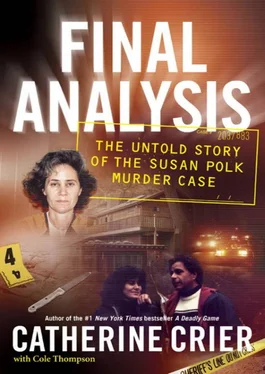“I have experienced it my whole life. She is a lady who values control and when somebody else maintains control over her life, I believe she contrives fantasies. Rather than use the word ‘delusion,’ I like to use ‘contrives fantasies’ to gain control of the other people [outsiders].”
In spite of Adam’s warning, the two attorneys forged ahead with their defense of Susan. In September 2005, Dan Horowitz and Ivan Golde filed a motion on her behalf, claiming Susan was the victim of legal maneuvering that was tantamount to bribery and extortion in connection with the civil suit. Horowitz claimed that Bud Mackenzie, the lawyer representing the Polk estate, was trying to put a “squeeze play” on Susan—raising the possibility that the Orinda house would go into foreclosure if she didn’t act. However, when Golde went back to the attorney and offered to put up his own money to halt the pending foreclosure proceeding, Mackenzie reportedly said the house was not in danger.
The motion alleged that Adam Polk was aware that the Miner Road house was not at risk but wanted his mother to believe it was in order to push her to settle. It also claimed that Susan had received veiled threats from an unnamed party that Adam and Gabriel would “testify with great anger and fear about the financial ‘situation’” if she did not agree to settle the suit.
While that motion as well as several others that the Horowitz/Golde team filed were denied, the civil suit was settled shortly thereafter, presumably in hopes that Adam and Gabe would be more friendly to the defense on the witness stand during the criminal case.
With the civil trial moving along, Horowitz and Golde began to hone their strategy for the murder trial. They publicly declared they could win Susan an acquittal at trial. Horowitz told ABC’s Good Morning America that he had no intention of presenting an insanity defense or a battered woman/burning bed syndrome. Susan was a woman who was abused regularly by her therapist husband, and she truly believed Felix intended to kill her the night the two argued in the couple’s guest cottage, the lawyer maintained. Dan Horowitz would argue a straight self-defense case on Susan’s behalf—or at least that’s what he intended to do.
Chapter Twenty-one
SUSAN’S STORY
The temperature had already reached seventy degrees when I arrived at the West County Detention Facility on October 1, 2005, nearly three years to the day after Felix Polk’s murder. I had come to the modern, tidy jail in Richmond, California, at Susan’s invitation for the first in a series of jailhouse interviews for my show, Catherine Crier Live.
Much had happened since Susan’s arrest in the fall of 2002. The most significant was Susan’s about face. For more than two years after Felix’s death, she had publicly maintained her innocence—although she claimed she told her mother and her attorney of her involvement five days after Felix’s death. As the investigation progressed over the years, she eventually changed her story from innocence to self-defense. No one has been able to pinpoint exactly when the change occurred, but Detective Mike Costa later told Court TV’s Lisa Sweetingham that he believed it was sometime in 2003 that he first heard Susan’s new claim.
While Susan had privately detailed the events in the guest cottage to her mother and her then-attorney soon after her arrest in October 2002, the first time she publicly uttered the self-defense argument was in an April 2005 article in the Contra Costa Times. In the article, written by reporter Bruce Gertzman during a time when Susan was not represented by counsel, she insisted that she and her husband were arguing on the night of October 13, 2002, when an enraged Felix came after her with a knife. She fought back vigorously, ultimately killing him in an attempt to save her own life.
A uniformed jail official escorted me to the small interview room where I would meet Susan for the first time. The jangling of keys alerted me to her entrance into the small room on the opposite side of a Plexiglas partition. Her well-groomed appearance surprised me. After nearly three years in jail, she was slender and graceful, even in the baggy prison outfit that hung from her gangly 5′6″ frame. Her once long dark hair was now streaked with gray and cut in a stylish bob. She wore little makeup, just lipstick and white eye-pencil, artfully applied to enhance her beautiful, unblemished skin.
I watched as she slid into a sturdy, metal-framed chair on her side of the cubicle, placing her neatly manicured hands atop the small table we shared. Looking up at me through the divider, she flashed a half smile and then glanced around nervously. Susan and I were about the same age, and during the interview we found several commonalities. Like Susan, I too, had married young. And while I had long since divorced my first husband, Susan had stayed married and raised three children with Felix. She claimed it wasn’t until her fortieth birthday that she realized she could no longer remain in the relationship. Felix was abusive and she wanted out.
I asked Susan what happened that night in the guest cottage. At times, her voice was so soft that I found myself leaning forward to hear her responses through the mesh opening just above the table.
“Well, we had things to talk about, um, and had arranged to meet later that night to have a talk,” Susan began in a quiet monotone. “I got to the door. I knocked. The lights were on, um, around eleven, and it looked like he might have been reading because…he had a book.”
Susan explained that she had a can of pepper spray in her back pocket, which she had purchased at a convenience store in Montana. The clerk told her that one pump would stop a grizzly bear in its tracks, and she was confident the spray would protect her.
I asked Susan about her conversation with Felix. Were they trying to figure out where the two would live? Whether she would stay in the house or return to Montana?
“It was practical,” Susan said. “He [Felix] offered to pay around three thousand dollars a month in spousal support and I wanted to discuss Gabriel, the kids, selling the house or not selling it. I wanted the kids to stay in the house. I didn’t want to spend a lot of money in a battle. I didn’t think it was worth it because I had been offering for months to just sign papers. It degenerated into an argument. He wasn’t being practical and it just became one of those arguments.”
“How did he get the knife?” I asked.
There was a long pause, as if Susan was searching for an answer. “I really don’t know,” she finally said. “What happened is he came over and backhanded me in the face as he’d done before. I pulled out the pepper spray. Sprayed him. He picked up the ottoman and charged at me with it, then grabbed me by the hair, threw me on the floor, punched me in the face again, and smeared pepper spray into my eyes.
“The next thing I knew, I looked up, and I saw a knife coming down, and I saw it go into my leg. I thought the reason I wasn’t feeling it was because, sometimes, I’ve read, people don’t feel it initially when they’ve been stabbed.
“It was like I flashed on ‘I am going to die. He is going to kill me. If I don’t do something right now, I will be dead.’
“I just thought of the one thing I could do and that was to kick him as hard as I could in the groin and hope at the same time I could get the knife from his hand. I kicked, pulled my leg back as far as a I could and kicked with as much force as I could into his groin, and went for the knife at the very same time, and his hand loosened just enough where I could grab the knife. And, um, I grabbed it, and I felt like I had to say something, and I said, ‘Stop, I have a knife.’
Читать дальше











